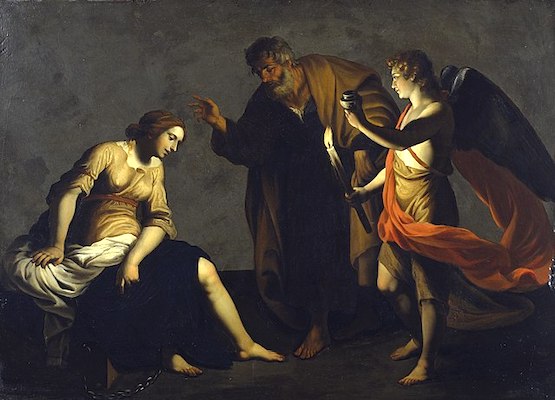
La Biografia
Santa Agata di Sicilia è una santa cristiana e martire vergine, nata intorno al 231 d.C. a Palermo o Catania, in Sicilia, in una famiglia nobile e ricca. Le identità dei suoi genitori restano sconosciute e non è chiaro dove abbia frequentato la scuola, dato il contesto storico e i limitati registri della sua vita.
La sua fede devota la portò a dedicarsi a Dio sin da giovane, rifiutando la proposta di matrimonio di un prefetto romano, Quintiano, nonostante le persecuzioni. Agata fu successivamente arrestata, torturata e martirizzata nel 251 d.C. per la sua fede cristiana durante il regno dell’imperatore Decio.
Nonostante fosse nata in un ambiente agiato, Agata dedicò la sua vita alla devozione religiosa sin da giovane. Prese un voto di verginità e resistette alle proposte di matrimonio del prefetto romano Quintiano, il che portò al suo arresto. Durante la sua prigionia, subì una brutale tortura, ma rimase ferma nella sua fede fino alla sua morte nel 251 d.C.
Tra gli aspetti intriganti della sua vita ci sono i miracoli che si dice abbia compiuto, incluso fermare l’eruzione dell’Etna un anno dopo la sua morte. Un’iconografia unica raffigura Santa Agata con le sue mammelle mozzate su un piatto, un testimonianza grafica della terribile tortura che ha subito.
La sua canonizzazione precede il processo formale stabilito dalla Chiesa Cattolica. Santa Agata è venerata come la santa patrona di vari gruppi e cause, tra cui pazienti affetti da cancro al seno, vittime di violenza sessuale, nutrici. La sua festa si celebra il 5 febbraio, un testamento della sua duratura eredità di fede e resilienza.
(Testo generato da ChatGPT4, giugno 2023. Revisione contenuti e formattazione a cura di Manuela Filomena)
Biography
Saint Agatha of Sicily is a Christian saint and virgin martyr, born around 231 AD in either Palermo or Catania, Sicily, into a wealthy and noble family. Her parents’ identities remain unknown, and it’s unclear where she went to school, given the historical context and limited records of her life.
Her devout faith led her to dedicate herself to God from a young age, rejecting the marriage proposal of a Roman prefect, Quintianus, despite facing persecution. Agatha was subsequently arrested, tortured, and martyred in 251 AD for her Christian faith during the reign of Emperor Decius.
Despite being born into affluence, Agatha dedicated her life to religious devotion from an early age. She took a vow of virginity and resisted the marriage proposals of the Roman prefect Quintianus, leading to her arrest. During her imprisonment, she underwent brutal torture, but remained steadfast in her faith until her death in 251 AD.
Intriguing facts about her include her reported miracles even after her death, such as stopping an eruption of Mount Etna the year after her death. She is also famously represented in religious art with shears and a platter bearing her own breasts, a stark reminder of the torture she suffered.
Among the intriguing aspects of her life are the miracles she is said to have performed, including reportedly stopping the eruption of Mount Etna a year after her death. A unique iconography depicts Saint Agatha with her severed breasts on a platter, a graphic testament to the gruesome torture she endured.
Her canonization predates the formal process established by the Catholic Church. Saint Agatha is venerated as the patron saint of various groups and causes, including breast cancer patients, rape victims, wet nurses. Her feast day is observed on February 5th, a testament to her enduring legacy of faith and resilience.
(Text generated by ChatGPT4, June 2023. Edited for style and content by R.H. Ruggles)
Risorse Internet

